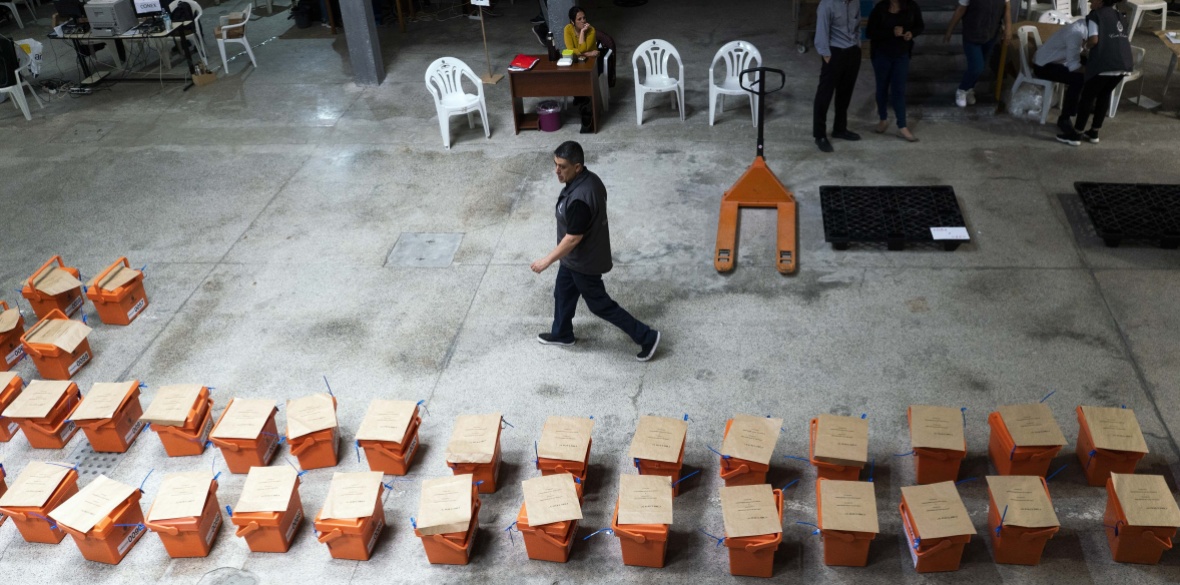This is the last article you can read this month
You can read more article this month
You can read more articles this month
Sorry your limit is up for this month
Reset on:
Please help support the Morning Star by subscribing here
NOT SINCE the constitutional reform of 1996 introduced a second round of presidential elections if no candidate gained 50 per cent of the popular vote in the first, has the South American republic of Uruguay experienced a contest so close that an announcement of the winner has had to be postponed pending further scrutiny.
But that is exactly what happened on Sunday November 24.
With 26,000 votes still to be counted, out of an electorate of 2.4 million, the right-wing candidate, Luis Lacalle Pou, was adjudged to have 48 per cent of the vote and his centre-left opponent, Daniel Martinez, 47 per cent — thus ensuring that the definitive result would not be made known until today or tomorrow. Or, according to one Argentinian newspaper in this football-obsessed region, “it’s gone to penalties.”
In the days leading up to the second round, the polls were indicating that Lacalle Pou would obtain a clear majority, much to the satisfaction of the local press which, as in much of Latin America, is dominated by corporate interests.
Perhaps the most surprising aspect of the vote is not that it was so close but rather that a large proportion of the Uruguayan electorate could even consider rejecting Martinez and his Frente Amplio (Broad Front) party that has held office for three consecutive terms since 2005.
During that period, salaries had grown in real terms by 60 per cent, poverty levels had decreased from 34 per cent to 8 per cent and destitution virtually eliminated.
In a region riven by unrest and social conflict, Uruguay is an atypical oasis of calm, enjoying the highest and most evenly distributed per capita GDP in Latin America.
In the first round of the election, held on October 27, Martinez was the overall winner with 39 per cent of the votes cast.
However, Lacalle Pou, representing the National or Blanco party, polled 28.6 per cent, Ernesto Talvi of the Colorados got 12.3 per cent and ex-armed forces chief, Guido Manini, at the head of the new ultra-right Cabildo Abierto party, received 10.9 per cent, meaning that their combined vote exceeded that of the Frente Amplio.
The Blanco and Colorado (White and Red) parties represent Uruguay’s political elite and until the Frente Amplio won their first victory in 2004, one or other of them (mostly Colorado) had been in office for 170 years.
Lacalle Pou is the son of former president Luis Lacalle Herrera, whose privatisation agenda was rejected by the electorate in the 1990s.
Talvi was educated at Chicago University and, like the Lacalles, is a firm disciple of the “Chicago Boys’” belief in turning public assets over to the private sector.
Though both men are keen to profess their democratic credentials, in true liberal fashion they have had no qualms about joining Manini in a “multicolour” right-wing coalition to support Lacalle Pou in the second round.
Given Uruguay’s status as Latin America’s most stable liberal democracy and its history of progressive governance, including the establishment of one of the world’s first welfare states, some political analysts have been surprised by how many people were prepared to cast their votes for Manini and his Cabildo Abierto Party’s reactionary policies on abortion, same-sex partnerships and immigration.
Manini himself is identified with the civil-military dictatorship that brutally interrupted Uruguay’s constitutional order between 1973 and 1985 and is on record as saying that it is the patriotic duty of military families to vote against the Frente Amplio.
Brazilian President Jair Bolsonaro is openly supportive of Manini and much of his vote has come from districts near the border.
It is reasonable to assume that, between the first and second round of the presidential election, some voters will have been influenced by events in other Latin American republics where popular unrest caused by the type of neoliberal policies espoused by Lacalle Pou has manifested itself in huge demonstrations on the streets of Ecuador, Chile and Colombia.
Nevertheless, and regardless of the closeness of the vote, it appears that Uruguayans, by the slimmest of majorities, have not heeded the Frente Amplio slogan of keeping the best and making it better.
That rejection of 15 years of progress will inevitably lead to an attack on social and economic gains made during that period in what has become a sharply divided country.










